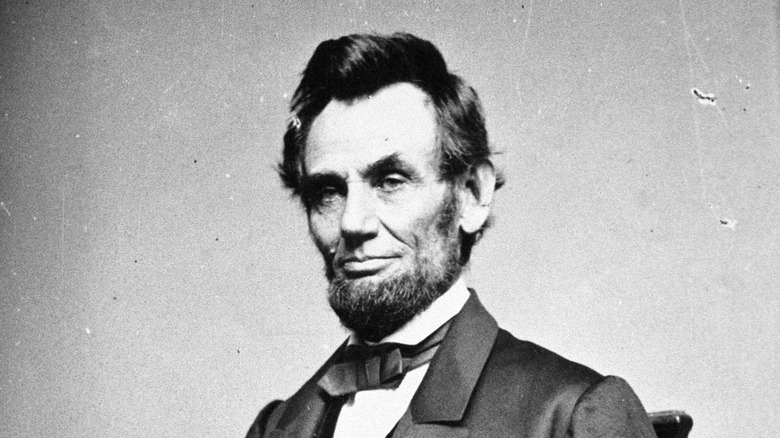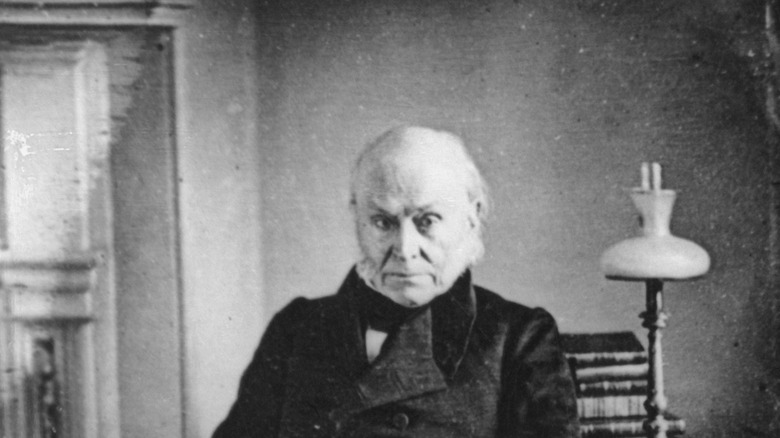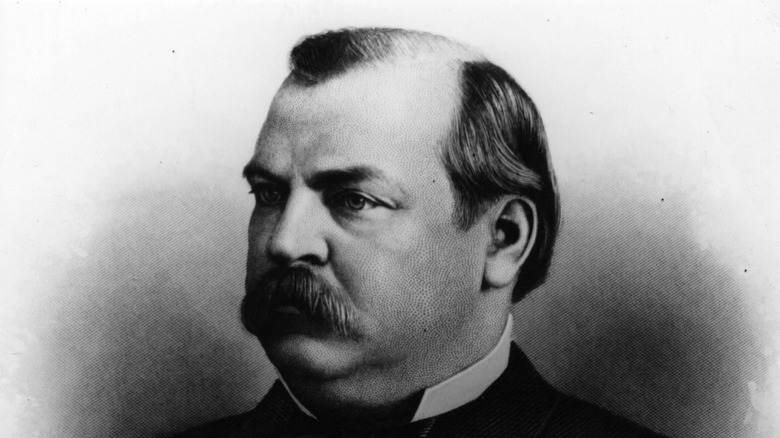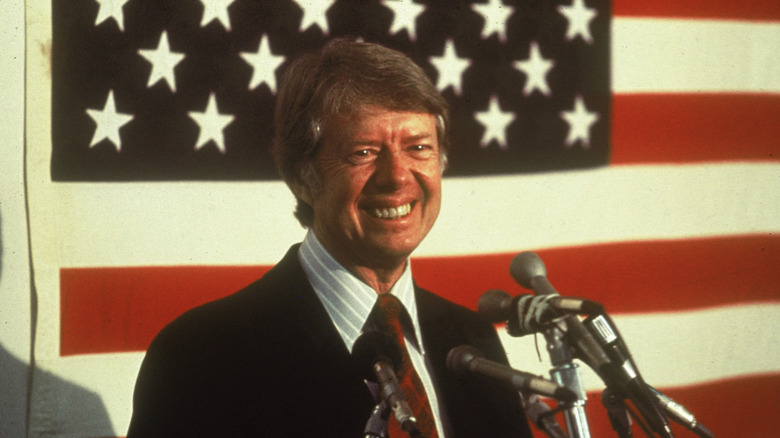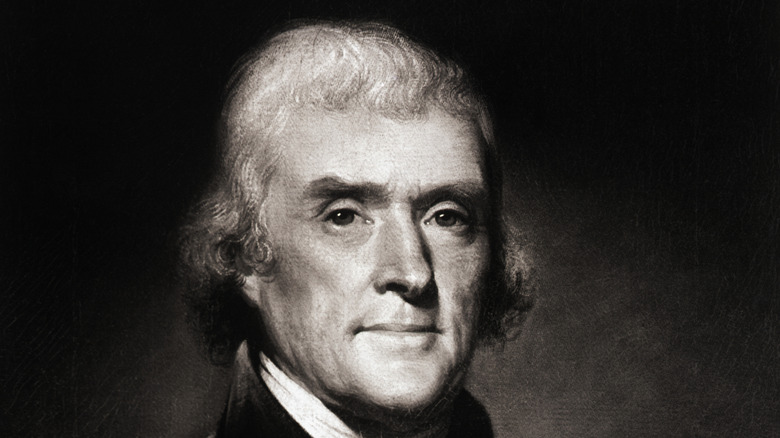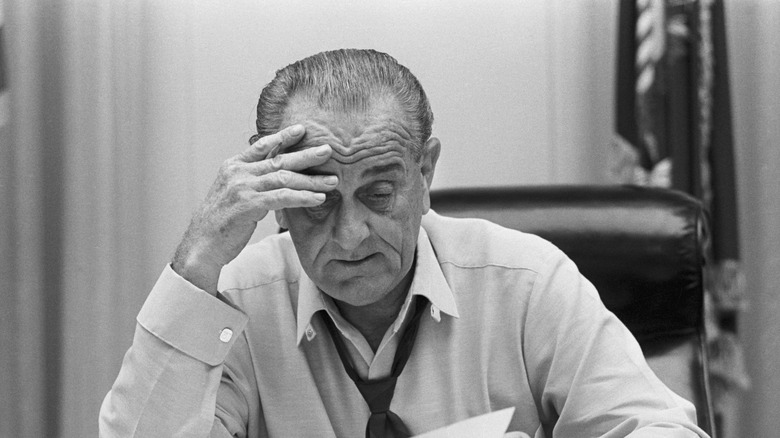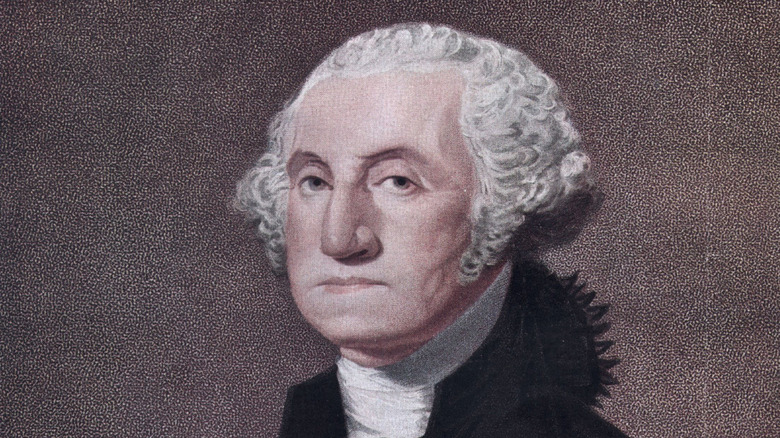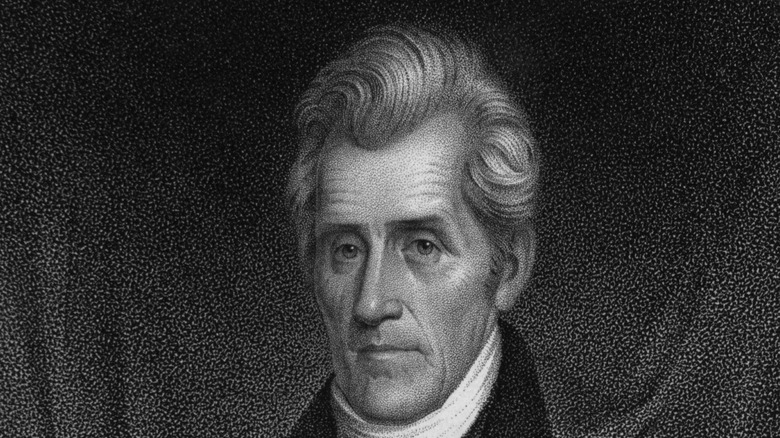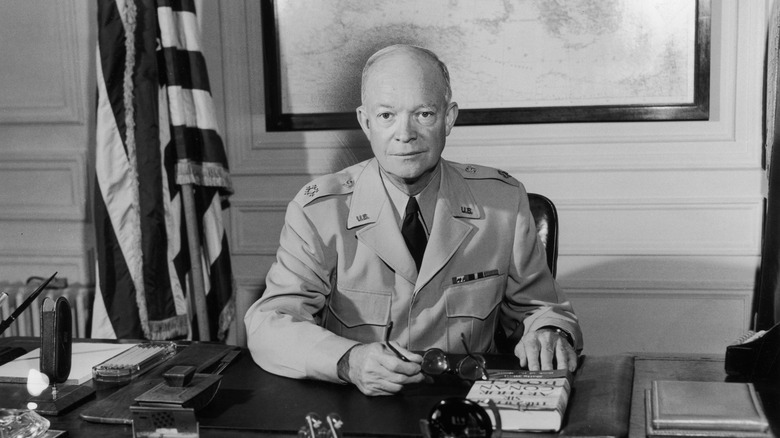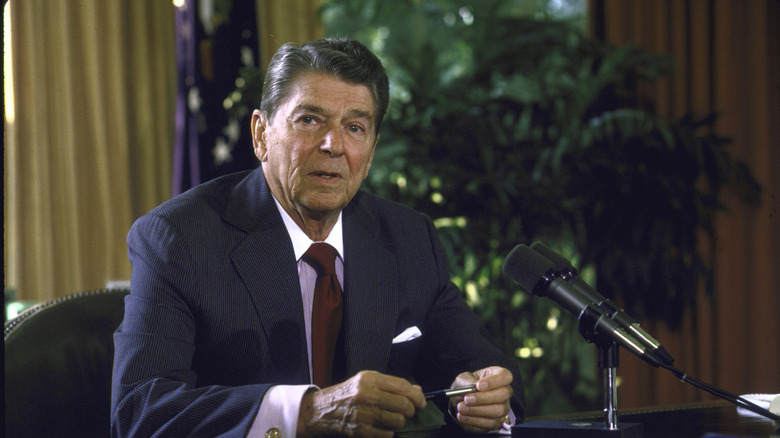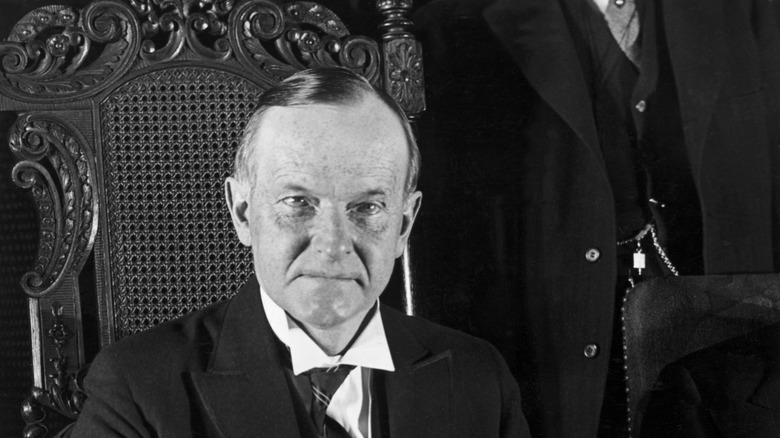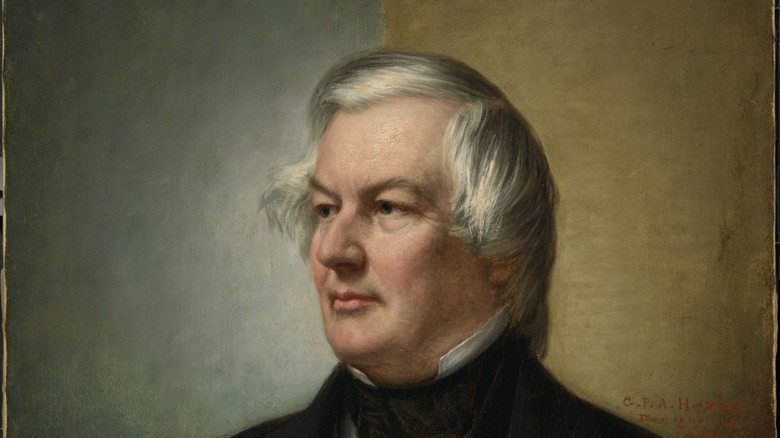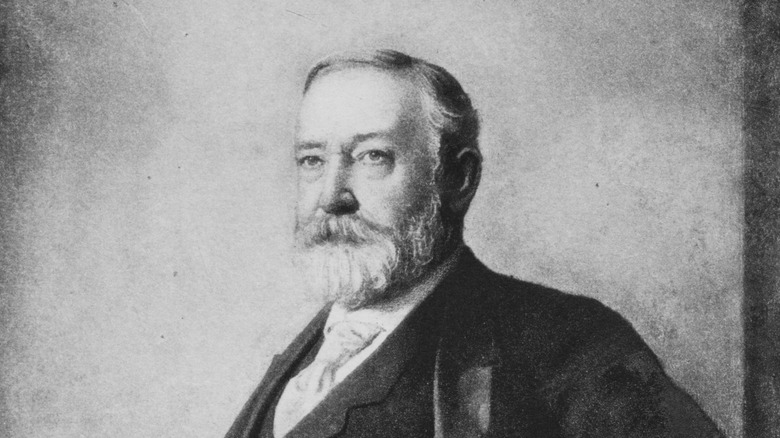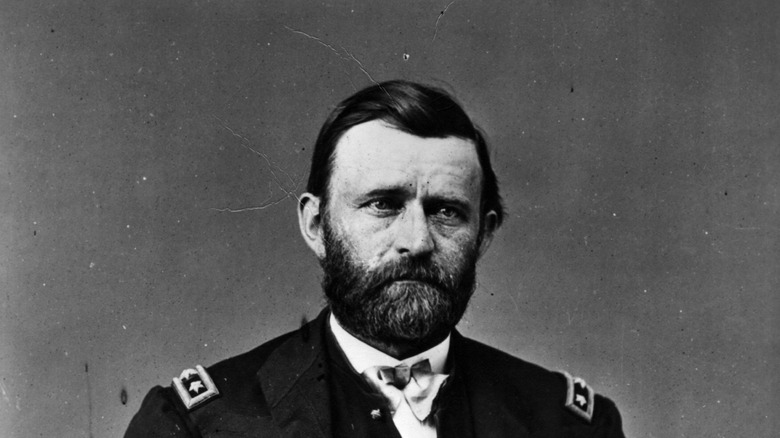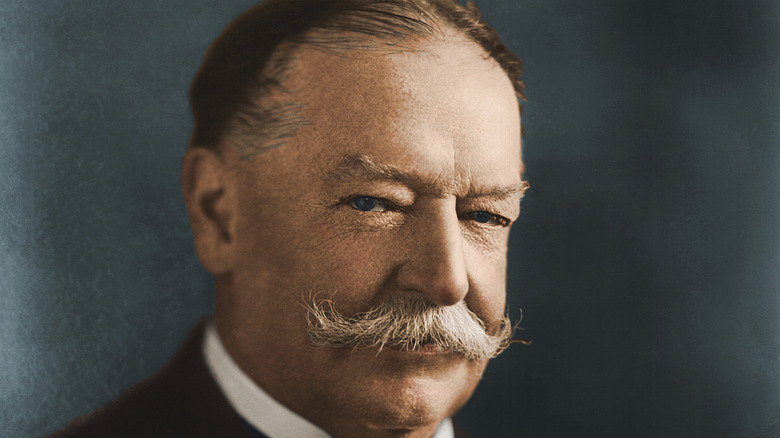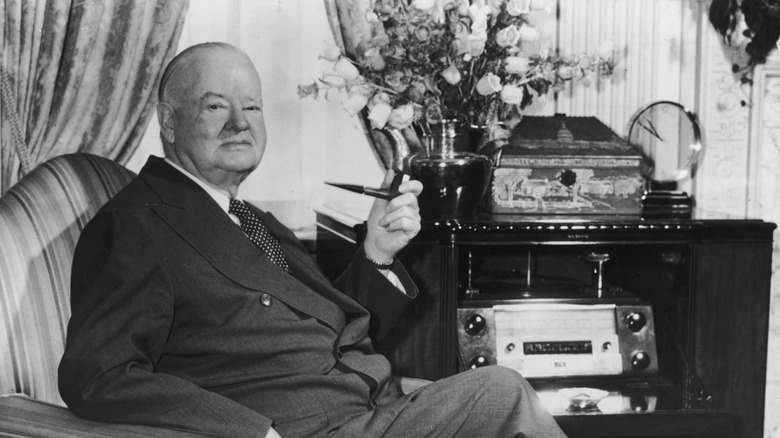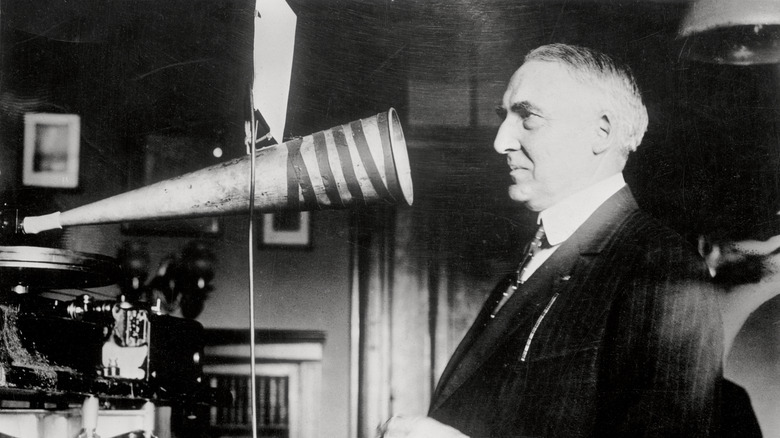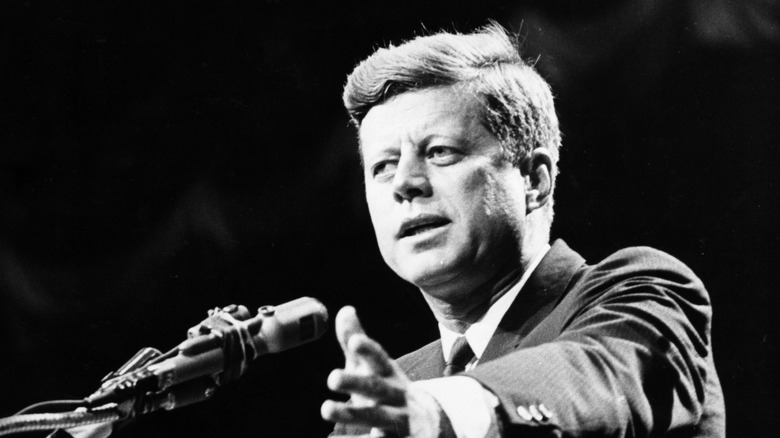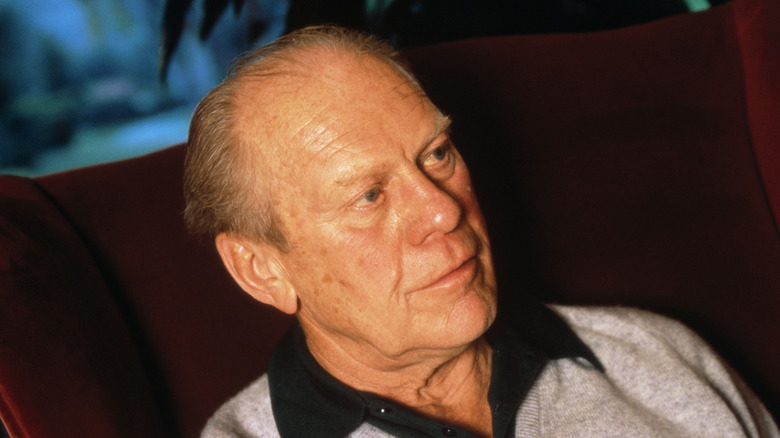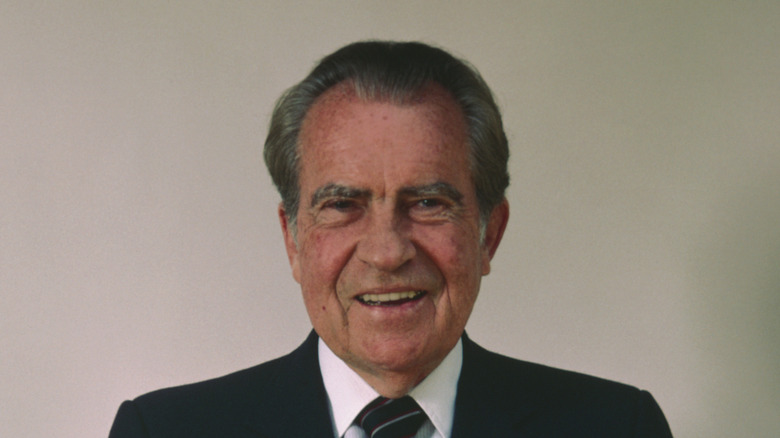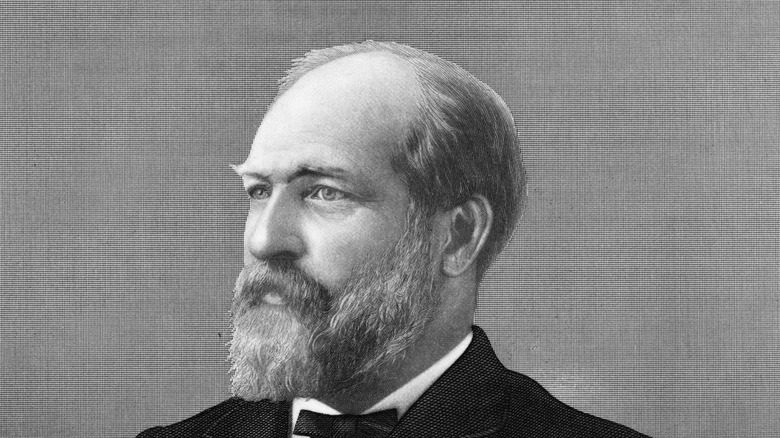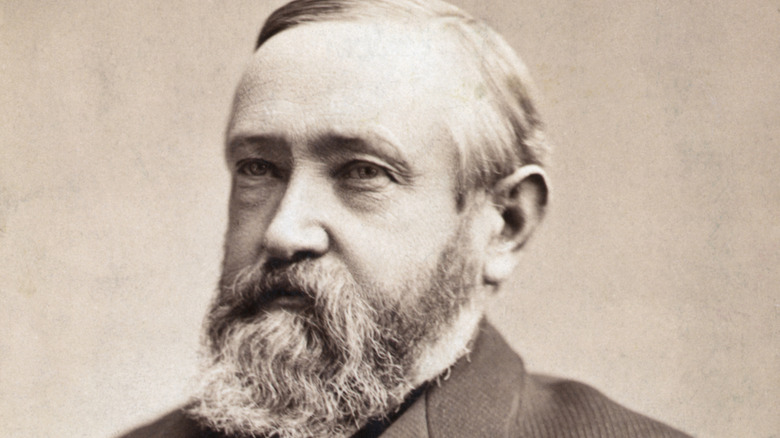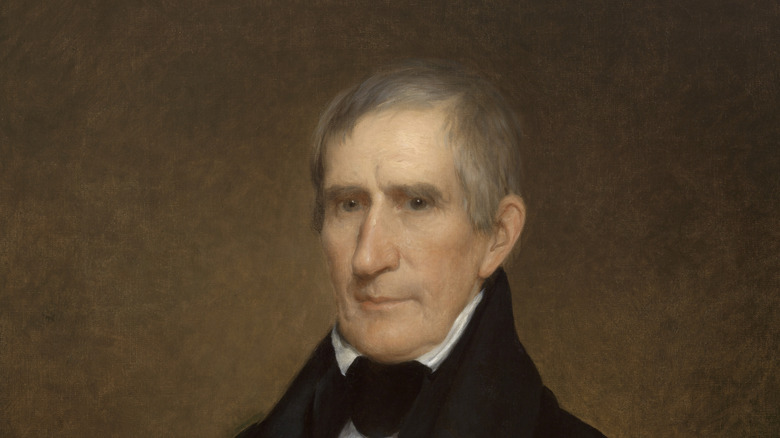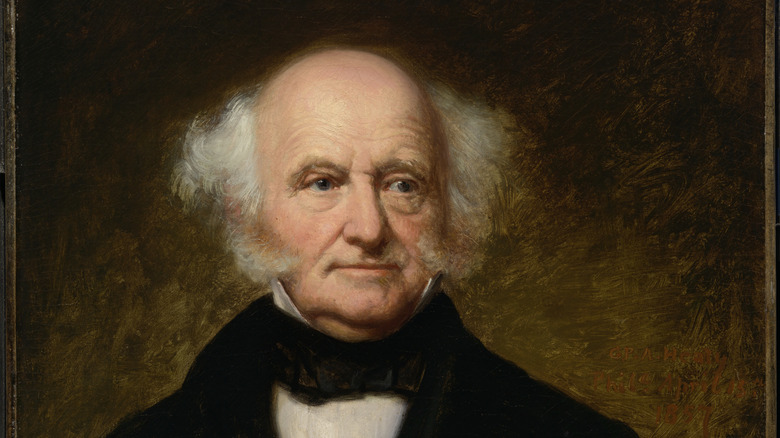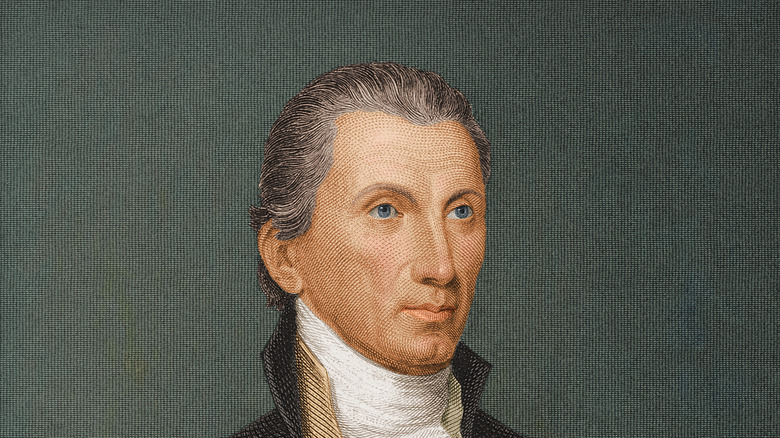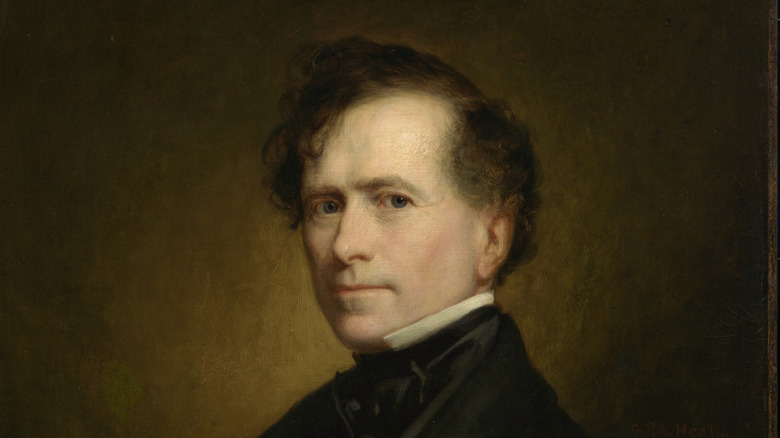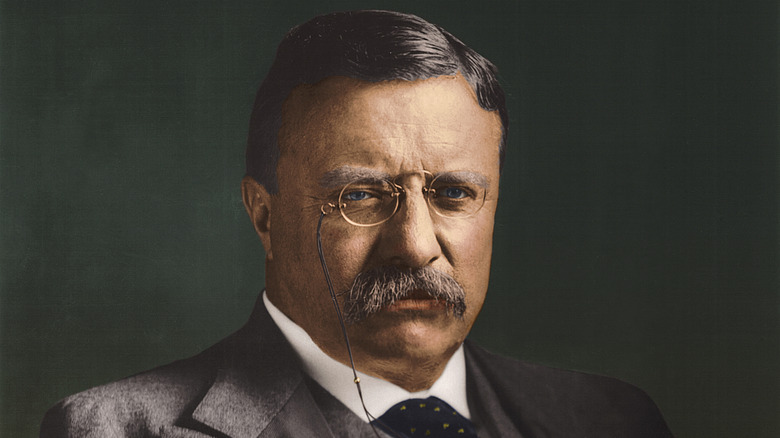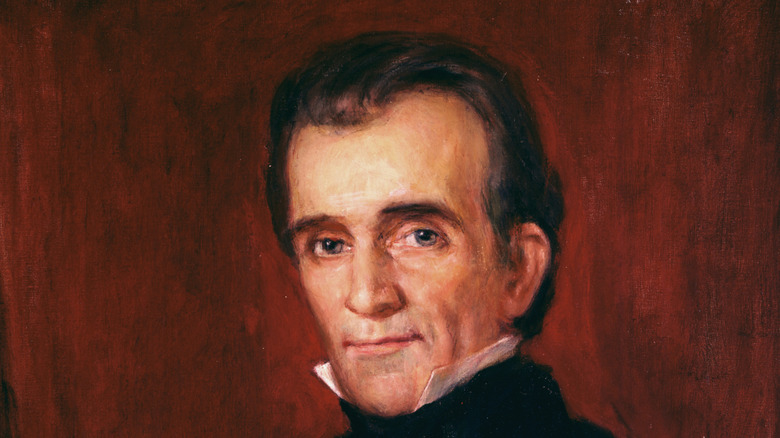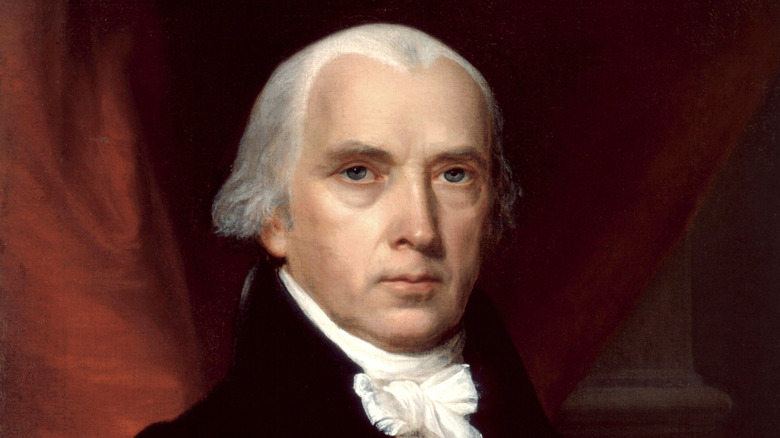U.S. Presidents Who Were Really Weird People
We may receive a commission on purchases made from links.
If the 2016 race for the White House was any indication, anyone who actually wants to become president has to be at least a little bit off their rocker. Indeed, throughout our country's history, many of the men who took the Oval Office have had some pretty head-scratching facts attached to their biographies. Here are the strangest U.S. presidents we've seen.
Abraham Lincoln: booze slinger
Long before Abraham Lincoln became the 16th U.S. president or issued the Emancipation Proclamation or hunted any vampires, he briefly paid the bills by running a combination store and bar in partnership with his friend William F. Berry. There was only one problem with this scheme — Berry was a notorious alcoholic. After owning the store for several months, Berry applied for, and received, a "tavern permit" for their business — he may even have forged Lincoln's signature on the joint bond application.
It should be noted that Lincoln was not a fan of selling booze by the individual drink in their store, and this disagreement ultimately led to the end of their partnership. But for a period of about three weeks in 1833, you could have walked into Berry & Lincoln in New Salem to load up on gingham fabric and seeds for your farm while slamming down a peach brandy or Holland gin — possibly served up by the future president himself.
After Berry started drinking up all the profits himself, Lincoln noped out of the situation. He sold his share in the store to Berry, who died just a couple of years later, saddling Lincoln with all the store's accrued debts. Lincoln ended up taking a job as the New Salem postmaster to pay back all the debt. Apparently, Honest Abe had never heard the old adage, "Never go into business with friends.
John Quincy Adams: skinny dipper
Now, here's something that could have only happened in the age before the internet and smartphones. According to many reports, John Quincy Adams — who, for those who did not pay attention in history class, was the sixth U.S. president — had a pretty big thing for skinny-dipping. Indeed, one of the 40-plus men to hold office in the White House loved to take off his clothes and go for a quiet dip in D.C.'s famous Potomac River.
According to an 1823 diary entry, Adams' daily ritual, which began at 5 a.m., had less to do with a weird sexual thing and more to do with keeping healthy habits. Ironically, Adams' penchant for nude swimming was actually quite well-known among the press. Case in point: Journalist Anne Royall was able to secure a history-making interview with President Adams by catching him skinny-dipping and then hiding his clothes until he agreed to answer her questions, according to the Huffington Post. Strangely enough, Adams was not the only president who loved to take his clothes off and go for a dip. Among the others, according to The New Republic: Theodore Roosevelt, Franklin Roosevelt, and, perhaps less surprisingly, John F. Kennedy. (JFK got up to lots of mischief.)
Grover Cleveland: former hangman
Way back in the day, the law stated that anyone found guilty of first-degree murder must be hanged by the neck, and the execution must be carried out by the sheriff of that particular county. According to a New York Times article published all the way back in July 1912, Grover Cleveland actually had to carry out this law while he served as the sheriff of Erie County back in 1872. At one point during his term, a young Irishman named "Jack" Morrissey was sentenced to death after being convicted of killing his mother. The Times writes that Cleveland "surprised the community and his friends" by announcing that he would, in fact, go through with performing the execution. Much of Cleveland's motivation was fueled by the fact that he was sick of people passing off the "obnoxious and degrading" task of executing murderers to the office's Deputy Sheriff Jacob Emerick, whom the public had nicknamed "Hangman Emerick."
"Jake and his family have as much right to enjoy public respect as I have," Cleveland was quoted as saying, "and I am not going to add the weight that has already brought him close to public execration." After performing Morrissey's execution, Cleveland was reported to have been sick for several days. "He was not so stolid and phlegmatic as very any persons have been led to believe," the Times wrote.
Jimmy Carter: UFO-observer
Is the truth really out there? According to former President Jimmy Carter, maybe. In 1973, the governor of Georgia claimed he saw an unidentified flying object during a 1969 visit to the Lions Club in Leary.
"It was the darnedest thing I've ever seen," Carter later said of the alleged sighting (per "Weird Georgia"). Carter actually filed a report on the incident in 1973, and he made UFO research a big component of his successful presidential campaign in 1976. Carter ultimately backed off on said research by the time he got to the White House — releasing that information to the public, he thought, would have been a threat to national security, which only made him seem that much more paranoid. However, decades later, Carter stood by his alleged sighting, recounting his experience in a 2007 interview with CNN. By that point, though, Carter claimed it was "impossible" that the unidentified object was actually aliens. Which, yeah, crazy.
Thomas Jefferson: extreme stage fright
He may be immortalized on Mount Rushmore, but when it came to public speaking, even a nervous first-grader could have wiped the floor with him. Who are we talking about? Oh, just Founding Father and third U.S. President Thomas Jefferson.
That's right, while Jefferson was an excellent writer — as evidenced by the Declaration of Independence — he reportedly suffered from crippling stage fright. As a lawyer, he struggled to even present cases, and he never even spoke during the monumental Second Continental Congress. "I never heard him utter three sentences together," claimed colleague and future second U.S. President John Adams (via "Diary and Autobiography of John Adams").
From what scholars can tell today, Jefferson may have only ever delivered two speeches himself — his two presidential inaugural addresses. Today, these speeches are among America's most famous inaugural addresses, but anyone who actually attended these speeches would have had a hard time telling you what they were about. Jefferson spoke so quietly that the people in the audience had to strain to hear him. Researchers from Duke University have concluded that Jefferson likely suffered from undiagnosed social phobia. So, for all you shy folks out there, if Jefferson could become president, so can you! You probably can't buy Louisiana again, though.
Lyndon B. Johnson: proud of his dong
While Lyndon Baines Johnson was well-known for things like his "War on Poverty," signing the Voting Rights Act, or escalating the war in Vietnam, one part of his legacy is decidedly more perverted. According to information from Robert Caro's exhaustive biography "Master of the Senate," LBJ wasn't remotely shy about his bodily functions — or his private parts. If the need to pee hit him, he'd whip out his member (which he affectionately dubbed "Jumbo") and let loose right then and there, even if "there" was the parking lot of the U.S. House office building. He was even known to give dictation to staffers while moving his bowels on his private office toilet, but there's no word if this practice included unwavering eye contact.
According to Caro, if another legislator walked into a public restroom while Johnson was finishing his business, he'd turn around while brandishing "Jumbo," exclaiming, "Have you ever seen anything as big as this?" He also was fond of scratching or adjusting his dangly bits whenever the need struck, reaching ostentatiously into a pocket and unabashedly jiggling things around until everything was arranged to his satisfaction. So basically, it sounds like LBJ was a lot like our Uncle Earl — the one who can be counted on every Thanksgiving to drink an entire bottle of Canadian Mist before passing out pantsless on Grandma's couch while watching the big game.
George Washington: booze distiller and partier
George Washington, the first U.S. president (just in case you forgot), lived in a time when drinking booze was both encouraged and pretty darn common. So it makes sense that he opened a distillery at his home in Mount Vernon, Virginia. It may even make sense that it produced almost 11,000 gallons of whiskey in 1799, making it one of the largest distilleries in the U.S. at the time. So, this Founding Father was no teetotaler. In fact, many people have talked about Washington's propensity for adult beverages, including a pretty big bar tab he ran up at City Tavern, Philadelphia.
The Mount Vernon website is quick to quote Washington, however, when he talked about moderation. The story goes that he had a carpenter named Thomas Green, who was a pretty hard drinker. Washington allegedly told him, "An aching head and trembling limbs, which are the inevitable effects of drinking, disincline hands from work; hence begins sloth and that listlessness which ends in idleness." In other words, "Up your tolerance, son." Washington could hold his drink, and he expected everyone else to as well. Also, while we're challenging expectations about our first president, you should be aware that that whole "chopping down a cherry tree" thing was a total myth (one of the lies you might have learned in history class).
Andrew Jackson: owner of a dirty bird
Andrew Jackson may have been responsible for the atrocities of the Trail of Tears, and he may have been a notorious brawler, but he apparently had a whimsical side as well. As the story goes, Jackson taught his pet parrot, Poll, to cuss up a storm. At his funeral, the allegedly parrot swore so profusely that attendees were shocked, and it had to be removed.
According to the book "Andrew Jackson and Early Tennessee History," thousands of people attended Jackson's funeral on June 10, 1845. The work quotes Reverend William Menefee Norment, who said the African gray parrot unleashed a string of profanity so offensive, it had to be removed from the service. Jackson had purchased the "wicked parrot," according to Norment, for his wife, but he bonded with it after her death. Now, the million-dollar question is — did Jackson sit and work with the bird to teach it the curse words? Or did it just hear Jackson himself cuss a blue streak, and the parrot picked it up? President Potty Mouth, perhaps?
There is some debate about whether or not all this is true. If not, it's just a fun story to tell. Maybe it was all made up as a nice way to forget how awful Andrew Jackson was — after all, he's the president who really leaned into the debacle that was the Trail of Tears.
Dwight Eisenhower: his war on squirrels
Dwight Eisenhower, a highly decorated World War II general, did a lot of cool things when he was president. To blow off steam, he really liked to play golf. He loved it so much, in fact, he wanted to practice his putt closer to work and home, so he had a putting green installed in 1954. However, his predecessor, Harry Truman, was super in love with the local squirrels. He liked to feed them, and the critters started burying nuts in the green, ticking off Eisenhower to no end. In his frustration, he joked that all the squirrels should be shot and told the groundskeeping staff to do something about the darn pests.
The poor groundskeepers tried to scare them — the squirrels weren't scared. Then, the staff started a trap-and-release program, where they let the animals out in some park in DC. That didn't do much to keep the population down, but Eisenhower did get into some hot water for trying to "rehome" the little fuzzy-tailed rodents. His opponents, in particular, jumped right on it, saying he was an enemy of wildlife. Animals in general? Ike liked. But squirrels on his putting green? Ike did not like, and he wanted them gone.
Ronald Reagan: obsessed with the stars
It might sound surprising, but one of our former presidents was a horoscope devotee. For years, the Reagans were known to be fans of the astrological arts. This interest in stargazing goes as far back as the '60s: When Ronald Reagan took office as California's governor in 1967, he was sworn in at a strange time: 12:10 a.m. Supposedly this time may have been chosen because the stars indicated it was particularly fortuitous.
What started as mostly an innocent New Age hobby turned into an obsession for Nancy Reagan after March 30, 1981 — the day Ronald Reagan was shot. According to Nancy's memoir "My Turn," astrologer Joan Quigley had warned Nancy something bad would happen that day. After the assassination attempt, Nancy became obsessed with her husband's safety, telling Quigley, "I'm scared every time he leaves the house." The Reagans came to depend on Quigley, with Nancy admitting in her memoir that the astrologer was consulted to help in "determining Ronnie's schedule."
If the idea of a sitting president turning to pseudoscience to set his schedule scares the crap out of you, it may go even deeper than that. Another astrologer, Joyce Jillson, claimed she even helped pick George Bush as Ronald's running mate. Additionally, Quigley alleged in her own memoir that her role was much larger than Nancy had let on. As reported by The New York Times, President Reagan claimed that "no policy or decision in my mind has ever been influenced by astrology." But according to the Los Angeles Times, in 1990, Quigley told the anchors of CBS' "This Morning" that "through Nancy, I really had a direct line to the president.
Calvin Coolidge: Ol' Vaseline Head
We've all heard stories of people resorting to alternative medicine to stay healthy, but Calvin Coolidge may ultimately take the cake. According to the (admittedly) sleazy-sounding book, "White House: Confidential," our 30th president "used to like having his head rubbed with petroleum jelly" every morning while he ate breakfast in bed. The reason: Coolidge apparently believed that somehow, some way, slabbing a bunch of Vaseline-esque jelly on his head over breakfast would be great for his health.
Coolidge's strange obsession with Vaseline was probably strange at the time. But by the 1950s, its use for scalp health and grooming was pretty mainstream. Today, most people probably wouldn't bat an eye if you rubbed some jelly on your head. Still, outlets like Healthline note that there isn't much research to support its effectiveness in promoting hair growth and health, and you should be cautious not to use too much.
Millard Fillmore: bibliophile to the extreme
Millard Fillmore isn't one of the most memorable or popular presidents, but one thing about him is super weird and super cool. The cool part is that he loved books. See, he grew up in a really poor family, and the family owned a total of three books when he was growing up — a Bible, an almanac, and a hymnal. Fillmore ended up loving books, however, and he and his wife actually formed the first White House permanent library. He even spent White House money on the first book (a dictionary) before the budget for the library was even approved by Congress.
This is where things get a little weird. Fillmore loved books so much that, on Christmas Eve morning in 1851, he literally risked his life for them. The story goes that on that particular day, fire chiefs alerted our nation's capital that the Library of Congress was on fire. What started the fire? They didn't know then, and we don't know now, but Fillmore hopped on one of the fire engines (horse-drawn, because it was a long time ago) to pitch in and help. Inspired by Fillmore's bravery, a few congressmen and cabinet members joined in, too. Fillmore also ordered the bucket brigade from the nearby local navy yard to help out. It took until noon the next day to extinguish the flames, and in the end, 35,000 books were lost. Fillmore, book-lover that he was, rebuilt the library. Yep, Fillmore risked his life (and his budget) for the love of books. Our kind of dude.
Benjamin Harrison: afraid of electricity
When President Benjamin Harrison first took office in 1889, there wasn't yet electricity in the White House — all illumination was provided by gaslights. But even though he oversaw the installation of electric lighting into the executive residence in 1891, he and his wife refused to touch any of the light switches themselves. This wasn't out of vanity or disdain for menial tasks — the couple were genuinely afraid of being electrocuted by the newfangled technology.
According to White House History, "Few people at the time had enough faith in electric lighting to use it exclusively — its use was barely a decade old." Put that way, we can kind of understand Harrison's fear of going boom just because he wanted a little extra light. After all, we all know that one old person convinced their cell phone is going to kill them or that going outside with wet hair will give them pneumonia.
Ulysses Grant: not as bloody as we thought
Would you believe that former General Ulysses S. Grant — commonly called a "drunken butcher" because of his battle tactics, per The Washington Post — was actually a would-be pacifist? Reportedly, Grant was not as much of a fan of violence as you might expect from observing just about anything he ever did. He claimed that he detested war and even had an aversion to guns. Additionally, according to a PBS biography of the 18th president, "He despised killing animals and hated blood so much he refused to eat meat unless it was charred." When he ran for election, his campaign slogan was actually "Let Us Have Peace."
When he won, America had a Republican president with anti-war and anti-gun views who despised killing animals and hated eating meat. Imagine that today? It just goes to show you how much the political parties of the U.S. have changed since then.
William Howard Taft: too big for his bathtub
Stop us if you've heard this one before: A man walks into a store and gets the largest tub of butter he can find. When he checks out, the cashier asks him, "What are you going to do with all that butter?" The man replies, "It's a secret, and I'd butter not spread it around."
That's a bad joke, but one that White House staffers during the Taft era might've used to conceal the embarrassing truth. That's because, for the last century-plus, a story has gone around that William Taft, our largest president, once got stuck in a bathtub and had to be prised out by four men and the aid of a pound of butter. The rumor has been so pervasive, it's even spawned its own children's book, "President Taft Is Stuck in the Bath."
There's no hard evidence this actually happened, as it's based solely on the claim of longtime White House usher Ike Hoover in his memoir, "42 Years in the White House." But there's plenty of evidence that Taft did have oversized bathtubs made for him. Notably, the USS North Carolina had to outfit a cabin with an extra-wide bathtub for Taft's trip to the Panama Canal. According to a 1909 issue of Engineering Review, a Manhattan company custom-made the tub with "pondlike dimensions" for the journey. Similarly sized tubs were installed in the White House and on Taft's presidential yacht.
Herbert Hoover: trapped in the closet
No, that title doesn't mean what you think it means — Hoover wasn't secretly gay, and he wasn't an R. Kelly fan (that we know of). Actually, it refers to the primarily African-American servants who worked at the White House during Hoover's term in office. According to long-time White House correspondent Kenneth Walsh, Hoover and his wife didn't want to see the staff doing their work in the executive residence and didn't wish for the staff to see them, either.
As a result, workers in the White House developed a system for avoiding Hoover or the first lady. As Walsh explained to NPR, "[S]ometimes they'd ring a bell a couple of times that it was the president, three times if it was the first lady. And they'd pile into closets, they'd hide behind bushes so the president couldn't see them." This set a precedent, with servants hiding from FDR and his family through the next administration until Harry Truman noticed and put a stop to it.
What we want to know is, what was a maid to do when cleaning the presidential bathroom and they heard Hoover's footsteps coming? Did they risk his wrath by being spotted, or did they duck behind the shower curtain while he did his presidential business? We may never know.
Warren Harding: terrible poker shark
President Warren Harding often felt overwhelmed by the pressures of his job, and he turned to more recreational pastimes to blow off steam. When he needed a break, he'd call in his "Ohio gang," a group of crooked politicians that he enjoyed playing poker and drinking booze with. Because who makes for a better gambling buddy than a crooked cheat with no morals and fewer scruples?
Teddy Roosevelt's daughter, Alice, described the atmosphere at these games in "The Ohio Gang": "The study was filled with cronies ... the air heavy with tobacco smoke, trays with bottles containing every imaginable brand of whiskey, cards and poker chips ready at hand — a general atmosphere of waistcoat unbuttoned, feet on the desk, and spittoons alongside." While President Harding certainly enjoyed himself, there was just one big problem: He wasn't that great at poker. Apparently Harding didn't know when to hold 'em, or when to fold 'em, and he got in so deep during one game that he ended up gambling away the official White House china set. Oops!
John F. Kennedy: lots and lots of drugs
John F. Kennedy is often regarded as one of the most charming and good-looking U.S. presidents in history. But behind closed doors, he was experiencing multiple illnesses, and he used just as many drugs to treat them. Kennedy's secrets were uncovered by Boston University history professor Robert Dallek, who revealed in his book, "An Unfinished Life: John F. Kennedy, 1917-1963," that Kennedy suffered from colitis, prostatitis, Addison's disease, and osteoporosis of the lower back, among other things.
"There was hardly a day that went by that he didn't suffer terribly," Dallek told ABC News' "Good Morning America." According to Dallek, Kennedy frequently took drugs ranging from codeine to Ritalin and a thyroid hormone. "To fight the pain, Kennedy took as many as 12 medications at once, taking more during times of stress," ABC News reported. In fact, during both the Bay of Pigs scandal and the Cuban Missile Crisis, Dallek said that Kennedy was on multiple drugs to treat his various pains and illnesses. At one point, he even took anti-anxiety medications to treat the side effects of some of his other drugs, according to the report.
Shockingly enough, Dallek says that, despite Kennedy's overflowing medicine cabinet, he was mostly able to keep his ailments a secret from the public, often out of fear that the news would damage his political campaigns.
Gerald Ford: gadabout
In 1973, Gerald Ford was the U.S. House of Representatives minority leader when he was appointed vice president to replace Spiro Agnew, who resigned after a scandal. Following President Richard Nixon's own scandal-triggered resignation in 1974, Ford ascended to the presidency. When compiled together into a cohesive biography, Ford's background is so varied, impressive, and decidedly not one associated with a president that it demands bemused acknowledgment.
Just after he was born, Ford's parents split up, and his mother married Gerald Rudolph Ford, who adopted and helped raise the child born Leslie Lynch King, Jr. That makes Ford the first officially adopted president and the only one to enter office with a name fully different from the one with which he was born. He also played amateur football while still in high school and was so good that the University of Michigan recruited him to play center and linebacker on the varsity squad. By his senior year, his teammates voted Ford their MVP. After graduation, he rejected pro contracts from two NFL teams to pursue enrollment at Yale Law School — which he paid for with a job as the university's assistant football coach. Another source of income for the objectively handsome young Ford: He was a contracted model with the John Robert Powers modeling agency.
Richard Nixon: gambler
Elected president in 1968, reelected in 1972, and resigning after he was implicated in the Watergate break-in and scandal in 1974, Richard Nixon took his political career as far as it could go. His rise was also extremely fast, as Nixon served as vice president from 1953 to 1961 after less than a decade in the U.S. House of Representatives and Senate. Nixon was a lieutenant in the U.S. Navy in the Pacific Theater campaign in World War II. In 1945, the war ended, and Nixon was discharged. A year later, he won the election for a congressional seat representing a district in his home state of California.
Raised in the Quaker faith, Nixon was raised to avoid gambling, and when he was sent to his naval post in the Solomon Islands in 1944, he didn't know how to play any card games. He was apparently a quick study. After spending two nights watching other naval officers play poker and asking some questions, Nixon understood the game so innately that he developed a strategy that helped him win a lot. By the time he was sent back to the U.S. for stateside service just months later, Nixon had won as much as $8,000 off of his cohort. That's more than $100,000 when adjusted for inflation, and it's what Nixon used to fund his successful first congressional campaign.
James Garfield: ambidextrous
James A. Garfield's assassination is the most notable thing that happened during the president's tragically short six-month term of office in 1881. Shot in July, he succumbed to his injuries in September, dying from internal hemorrhaging and an infection endured during a botched recovery period in which he was subjected to a bullet removal technique with an early metal detector designed by telephone inventor Alexander Graham Bell. Those terrible final months overshadowed President Garfield's exceptional intelligence and the tricks it enabled him to perform.
Garfield had a high aptitude for language. During a campaign speech delivered at his Ohio farm in 1880, he spoke to a large crowd of German immigrants in their language. The president was also fluent in Latin and Greek, and he could use both languages at the same time. Garfield considered himself left-handed, but he was actually ambidextrous, able to write with both hands with near-equal skill. He'd entertain and impress others with his ability to pen a sentence in Latin with one hand and write the Greek translation with the other, simultaneously.
Benjamin Harrison: eschewer of electricity
Electricity was a cutting-edge technology in the early 1890s, with a minuscule portion of the United States wired for lights and power during the administration of President Benjamin Harrison. Developed and popularized in part by Thomas Edison, the inventor's early electric company, Edison, won a government contract in 1891 to wire the State, War, and Navy Building, situated adjacent to the White House. The generator could power both buildings, so the federal government opted to outfit the presidential headquarters for lights, too.
That was all to the chagrin of President Harrison, who, like most Americans at the time, found electricity to be so new and potentially untrustworthy that he tried to avoid the modern marvel as much as he could. Irwin Hoover, who worked as an electrician before he was appointed White House Chief Usher, counted among his duties turning off and turning on the various lights throughout the private quarters of the building. Hoover activated the lights at night and would turn them off in the morning. "The Harrison family were actually afraid to turn the lights on and off for fear of getting a shock," Hoover wrote in "Forty-Two Years in the White House" (via White House History).
William Henry Harrison: brash
Before the election of 1840, pundits set forth the idea that 67-year-old Whig Party candidate William Henry Harrison was too elderly to be president. In an editorial, John de Ziska of the Baltimore Republican dismissively suggested that Harrison ought to just retire and enjoy old man life. "Give him a barrel of hard cider, and settle a pension on him ... He will sit the remainder of his days in his log cabin by the side of the fire," he wrote (via the Nabb Research Center). Harrison's response: He adopted "Log Cabin and Hard Cider" as a wry, ironic campaign slogan, which served to characterize the otherwise wealthy and upper-crust Harrison as a populist. The campaign even distributed miniature log cabins and actual barrels of hard cider to drive home the point.
Harrison defeated Martin Van Buren in an electoral vote landslide, and he took the oath of office in March 1841. He followed that up with an 8,445-word address, the longest inaugural speech of all time. The temperature in Washington, D.C., that day peaked in the forties, and Harrison opted to take the stage poorly dressed for the cold, avoiding gloves and a hat and keeping the same wet clothes on for three balls and a parade. By the end of March, Harrison had contracted pneumonia. On April 4, the president died.
Martin Van Buren: toilet aficionado
Indoor plumbing — with toilets hooked up to pipes to bring in water and expel waste — was brand new in the United States in 1840. The vast majority of Americans did their business in outhouses or other facilities located outside of their homes. And at first, only the very wealthy had the means to design and devote a room in their homes to bodily functions. President Martin Van Buren was among them, and a very enthusiastic early adopter at that. While he held the highest elected office in the United States from 1837 to 1841, Van Buren began planning his eventual retirement, and he bought a large country manor in Kinderhook. The town in eastern New York state was where he'd been born and raised in an enclave populated by immigrants from the Netherlands. Van Buren learned to speak English later in life — Dutch was his first native language.
The well-appointed home was outfitted with a wine cellar, six large bedrooms, quarters for servants, and, most notable for the era, a single toilet. And while such appliances were relatively new, Van Buren's model was far from rudimentary. Encased in a wooden frame, the president's elaborate toilet made use of a wall-hung 100-gallon water tank, which operated from a pump in the home's basement. The bowl of the toilet was made from china.
James Monroe: fashionably late
Even in the early 1800s, prominent men were expected to keep up somewhat with the latest fashion trends. Back then, as it would be now for celebrities, dressing in clothes associated with an era more than 50 years in the past would characterize a public figure as out of touch, if not just plain bizarre. Of the "Founding Fathers," the group of politicians who helped create the framework for the American Revolution as well as its early government, James Monroe was the fifth and last to be elected president. Monroe's two terms spanned from 1817 to 1825, a period that was a good five decades removed from the heady days of the expulsion of British crown rule and the creation of the United States.
Nevertheless, Monroe was so closely associated with that heavily romanticized period of history that he played it up in his day-to-day life. Monroe generally appeared in public looking like a time-traveler from the 1770s, dressed in a tied and powdered wig, a tailcoat, knee breeches, tall stockings, shoes with buckles, and a tricorne, or cocked hat. All this led to the somewhat derisive nickname for Monroe, "The Last Cocked Hat."
Franklin Pierce: drunk driver
In the years before he was elected president in 1852 — the Democratic Party nominated him on its 49th ballot — Franklin Pierce fought in the Mexican-American War and was ranked as high as brigadier general. He won the election after deflecting charges of wartime cowardly actions for failing to fight effectively after he severely hurt a leg when his horse fell on top of it. And Pierce was once more involved in a horse-based scandal, though he was president when it happened, and alcohol was a factor.
Oddly, the news of a sitting president facing the 19th-century equivalent of drunk driving charges wasn't widely distributed until the late 1920s. While riding his horse in Washington, D.C. in 1853, President Pierce guided his animal right over a female pedestrian. Pierce was reportedly arrested, and while police believed him to be drunk at the time of the incident, no charges were ever filed.
Teddy Roosevelt: preternaturally strong
Freewheeling, tough, and seemingly up for anything if it seemed adventurous, President Theodore Roosevelt embraced danger like he had something to prove, either to the world or to himself — and maybe he did. As a child growing up in the second half of the 19th century in New York City, young Roosevelt was often housebound due to childhood illness and suffered from frequent attacks of his asthma. He had a keen intellectual fascination with nature, however, and when he was able, he collected samples of dead things for study, including fish, snakes, and mice. Unable to attend school because of his health issues, Roosevelt was educated at home and improved his physical stamina when his father put in a home gymnasium. By 1881, he was strong enough to climb the Matterhorn in the Alps during his honeymoon.
In 1884, during a stint as a New York State assembly member in Albany, Roosevelt received a telegram requesting he return home. On Valentine's Day, his mother died of typhoid fever, the same day his wife died from kidney disease. At the end of the legislative session, Roosevelt mourned by traveling to the Dakota Territory and opening a cattle ranch. Then, in 1898, the relentless Roosevelt, nearly 40 years old at the time, volunteered to serve in the Spanish-American War, leading his squadron of Rough Riders to victory in the Battle of San Juan Hill.
James K. Polk: overly sedate
Previously obscure in national politics, Tennessee governor and congressman James K. Polk was elected president in 1844. And he had an intriguing public outreach method: He kept an open door policy at the White House. Two times a week, citizens could drop by to discuss important issues with the president. While Polk was very social in that sense of the word, he was otherwise quite reserved. Unsurprisingly, the president gave first lady Sarah Polk full authority over the White House's domestic scene. Devoutly religious, she didn't allow any entertainments deemed sinful to take place at the presidential residence, publicly or privately. That meant that no liquor was served anywhere, even at official functions. Also forbidden during the four years Polk was president: dancing, all card games, and music. The inaugural ball featured dancing and music, but it disappeared from the presidential world until Polk left office in 1849.
The commander in chief consumed alcohol on the rare occasion, however. When he was 17 years old, he endured a kidney stone removal surgery. And in the pre-anesthesia days of the early 1800s, he remained coherent for the procedure, with only a few sips of brandy to help with the pain.
James Madison: odd communicator
James Madison's presidential claim to fame is that he was the smallest head of state in American history. He stood 5 feet, 4 inches tall and weighed around 100 pounds. Nevertheless, he stood up to the loud, impassioned, and persuasive Patrick Henry. In 1788, after the U.S. attained independence, a coalition of Virginia politicians met to decide if they'd approve the U.S. Constitution that Madison helped craft. Henry gave a loud and angry speech in opposition to ratification, and Madison was left with the unenviable task of winning over the crowd. He somehow won the fight in an early American political version of a debate club event or rap battle, giving thorough and dismissive rejections to all of the points that Henry had so fiercely thrown out. The physically small Madison spoke quietly and murmured most of the time, but Virginia's reps went with him and ratified the U.S. Constitution.
Indeed, Madison had a knack for communicating in exactly the way he preferred. In his personal correspondence, he aimed to protect his privacy and maintain security by employing the use of a code system, or what he called cyphers. Apparently, he had a deep fear of people reading his private and public correspondence.
